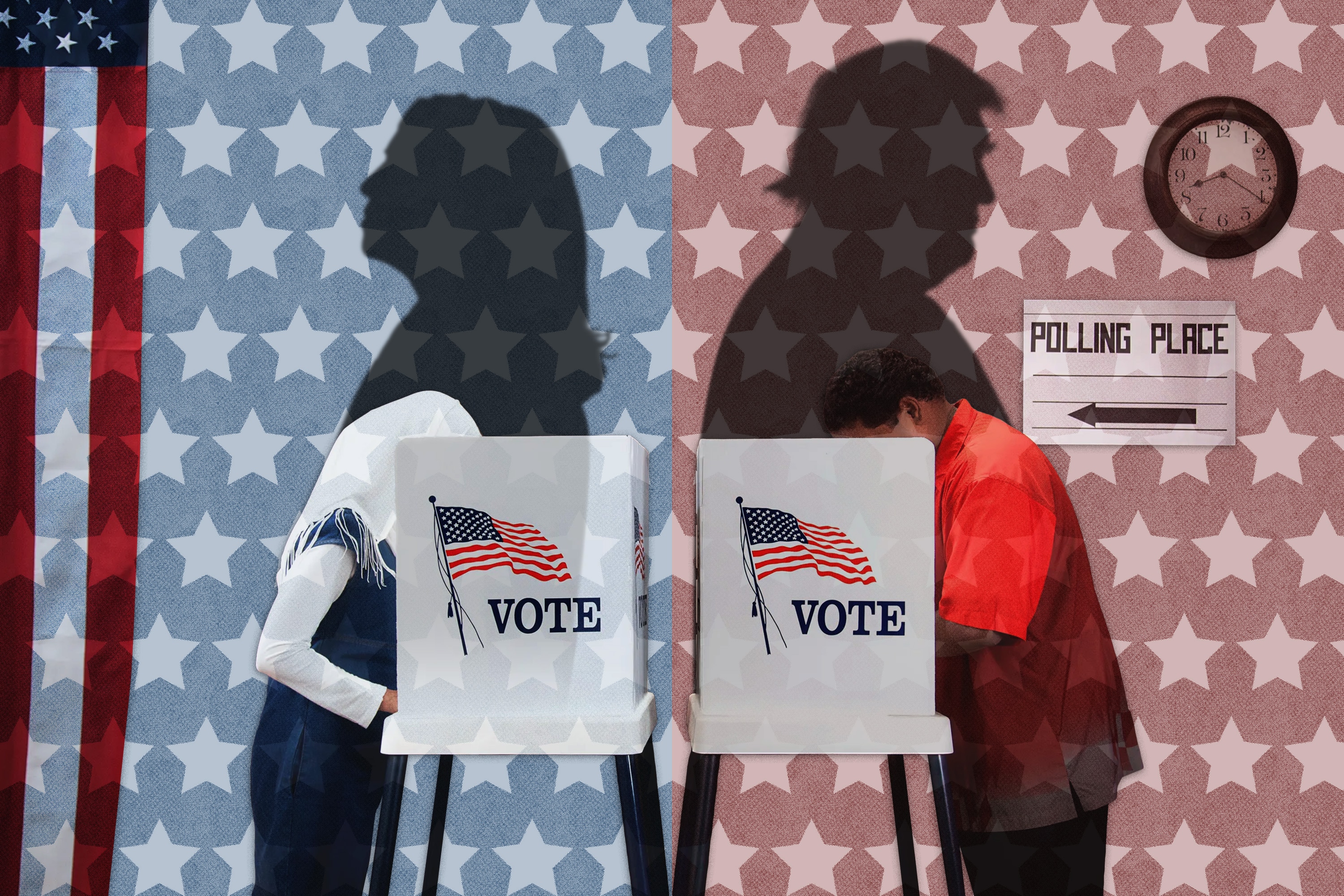Beyond Kamala Harris and Donald Trump, a multitude of small things can change the US election
analysis
NBy Nick Bryant
Topic:US Elections

Rarely, if ever, has a presidential election had so many moving parts.
In this head-spinning presidential election, where should we fix our gaze?
Donald Trump, needless to say, commands round-the-clock attention. Even a quiet Sunday afternoon on the golf course, where earlier this month he was stalked by a would-be assassin, became breaking news.
Kamala Harris is a gripping figure, whether headlining the kind of joyful stadium rallies Democrats have not witnessed since the Obama years or sitting for a heart-to-heart with Oprah Winfrey.
Vice-presidential candidates do not ordinarily get much of a look-in, but JD Vance and Tim Walz have both become scene-stealers.
The dramatis personae has also included the actor George Clooney, the wrestler Hulk Hogan, the former Democratic House Speaker Nancy Pelosi and a once obscure far-right provocateur named Laura Loomer, who the Trump campaign evidently wants to make a speedy return to obscurity. In the week which marked the 25th anniversary of The West Wing, nor should we overlook the current occupant of the Oval Office, one Joseph Robinette Biden Jr.
Yet the fringe theatre could also determine his successor. The off-Broadway drama. In an election likely to turn on a small shift of votes in a small number of states, seemingly small things could end up being of out-sized significance.
Anything that drives or depresses turn-out in the seven swing states — Arizona, Georgia, Michigan, Nevada, Pennsylvania, Wisconsin — has the potential to be determining. Nor should we ignore Nebraska, but more of that later.
Abortion ballots in two states
Two of those seven battlegrounds, for instance, have ballot initiatives on abortion — an issue which has received considerable attention following the overturning of Roe v Wade in 2022 though arguably not enough.
In Arizona, voters have the opportunity to codify "the fundamental right of abortion," a ballot initiative that could boost turn-out especially amongst young women. In Nevada, too, a proposed amendment to the state constitution enshrining abortion access is also on the ballot.
Abortion is not the paramount issue in either of these Sunbelt states. A Fox News poll in August found that 16 per cent of Arizona voters and 13 per cent of Nevada voters consider it their most pressing question. But those voters, in a photo-finish election, loom large. In 2020, Biden beat Trump in Nevada by just 33,596 votes. In Arizona, his victory margin was even narrower, 10,457 votes, just 0.3 per cent of the more than 3 million ballots cast. Watch that space.
The outcome in Georgia
In Georgia, another state that Biden won narrowly (11,779 votes), rule changes enacted by the Republican-controlled state legislature have been designed to advantage Trump.
First of all, the changes have undercut the authority of the Georgia Secretary of State Brad Raffensperger, who in the aftermath of the 2020 election bravely rejected Trump's request to "find 11,780" votes (the former president is presently fighting state criminal charges in Georgia, related to that call, of unlawfully conspiring to change the outcome of the election in Georgia).
They also potentially pave for the way for three Trump supporting Republicans on the five-member State Election Board to delay the certification of Georgia's results beyond the national deadline of December 11 if they find any evidence — or give credence to any specious rumours — of voting irregularities. "Pit bulls fighting for honesty, transparency and victory" is how Trump has characterised the three Republicans. The Democrats, meanwhile, have launched legal action against them.
Polls suggest the former president is presently ahead in Georgia. If, however, Harris were to come out on top, the State Election Board, with its Republican majority, could feasibly attempt to block her from receiving its 16 Electoral College votes.
Always it is worth remembering that presidential elections do not have standardised rules. Under the US constitution, every state has the right to define its own voting methods. So a dispute in Georgia could throw the nationwide election into what they New York Times has described as "a legal grey area."
Chasing Nebraska's blue dot
In Nebraska, meanwhile, Republicans have been trying to alter the way its electoral votes are allocated. Of the 50 states, 48 allot their electoral votes on a winner-takes-all basis. Maine and Nebraska allocate their 5 votes to reflect both the state popular vote and also the outcomes in its four congressional districts. In 2020, this enabled Joe Biden to pick up one electoral vote in this overwhelmingly red state by winning the congressional district that takes in Omaha, its biggest city.
If Harris were also to pick up one electoral vote in Nebraska — the "blue dot," as it has been called — she could afford to lose Arizona, Georgia, Nevada and North Carolina, but still win the White House so long as she won all the usual reliably blue states along the three swing Rust Belt states of Michigan, Pennsylvania and Wisconsin.
To cut off that straightforward path to victory, Trump for months has been pressing for a change to the rules to make Nebraska a winner-takes-all state. But this week, the pivotal Republican state lawmaker, Mike McDonnell, who switched parties from the Democrats only this year, announced he favoured the status quo. This meant Trump allies fell one vote short.
If Nebraska provides Harris's winning margin in the Electoral College, McDonnell, a former fire chief, will become more than a footnote in history. He will have altered its course.
North Carolina's governor race
Then there is North Carolina, where the race for the Governor's mansion is spilling over into the race for the White House.
In a scandal that speaks once more of the Jerry Springerisation of US politics, the Republican nominee for Governor, Mark Robinson, has faced calls to step aside after CNN reported that he referred to himself more than a decade ago as "a black NAZI" on a pornographic website.
The African-American Republican, a featured speaker at the party's convention, also defended slavery and said he enjoyed watching transgender porn, even though publicly he opposes transgender rights. Robinson has denied the claims. "Those are not the words of Mark Robinson," he protested. But the scandal could tar Donald Trump, who earlier this year heralded Robinson, the Lieutenant Governor, as "Martin Luther King on steroids."
North Carolina has only twice gone Democrat since the late-1960s — in 1976, when Jimmy Carter won the state, and in 2008 when voters backed Barack Obama. In 2020, however, Trump only won by 1.3 per cent, and polls suggest this red state has become more purple since Kamala Harris became the Democrat's presidential nominee.
Its 16 electoral votes are very much up for grabs, and a lesson from the Trump years is that scandal-prone MAGA Republicans running in state and congressional elections have caused the party to underperform.
We need sharp peripheral vision
Rarely, if ever, has a presidential election had so many moving parts.
What impact will the Middle East conflict, which this week saw a dramatic escalation, have on Muslim-American voters, a comparatively small but largely Democratic constituency. In Pennsylvania, some 125,000 Muslims voted in 2020. Biden's winning margin was 81,000 votes. Muslim-Americans also helped Biden win Georgia and Michigan.
Could the Green Party candidate, Jill Stein, wreck Harris's chances, as she did for Hillary Clinton in 2016? Had Stein backers become Clinton voters in the Rust Belt trifecta of Michigan, Pennsylvania and Wisconsin, America would have already had its first madam president.
In this electoral panorama, then, there is a lot to keep an eye on. Rather than a singular focus, it requires sharp peripheral vision.
Nick Bryant, a former BBC Washington correspondent, is the author of The Forever War: America's Unending Conflict with Itself.
By:https://www.abc.net.au/news/2024-09-30/kamala-harris-donald-trump-small-things-can-change-us-election/104400504(责任编辑:admin)
下一篇:At least 23 people dead after school bus carrying teachers and students catches fire in Thailand
 Socceroos rescue a point
Socceroos rescue a point  Wallabies thrash Wales 52
Wallabies thrash Wales 52 Jake Paul beats Mike Tyso
Jake Paul beats Mike Tyso Live updates: England vs
Live updates: England vs  US election 2024: Donald
US election 2024: Donald  US election live: Kamala
US election live: Kamala
- ·North Korea's latest weapon agains
- ·Hezbollah says Israel 'cannot impo
- ·Inside the rise of US oligarchs and how
- ·Thailand's worst suspected serial
- ·Tabi shoes are turning heads from Holly
- ·FBI arrests Florida man planning attack
- ·Illegal immigrant gets life sentence fo
- ·Bibles, water, watches and sneakers: Do
- ·North Korea's latest weapon against
- ·Hezbollah says Israel 'cannot impose
- ·Inside the rise of US oligarchs and how i
- ·Thailand's worst suspected serial ki
- ·Tabi shoes are turning heads from Hollywo
- ·FBI arrests Florida man planning attack o
- ·Illegal immigrant gets life sentence for
- ·Bibles, water, watches and sneakers: Dona
- ·US to give Kyiv anti-personnel landmines
- ·An arrest warrant for Benjamin Netanyahu
- ·One of Vietnam's high-profile politi
- ·Shanghai Walmart Attack: A Man Randomly S
- ·South Korean police officers jailed over
- ·Cambodia publicly shames maid deported af
- ·North Korea to use all forces including n
- ·Philippines condemns China attack of Viet
- ·US adds 2 more Chinese companies to Uyghu
- ·North Korean defector steals South Korean
- ·Malaysia deports Cambodian worker for cal
- ·Rebels battle for Myanmar junta’s weste

